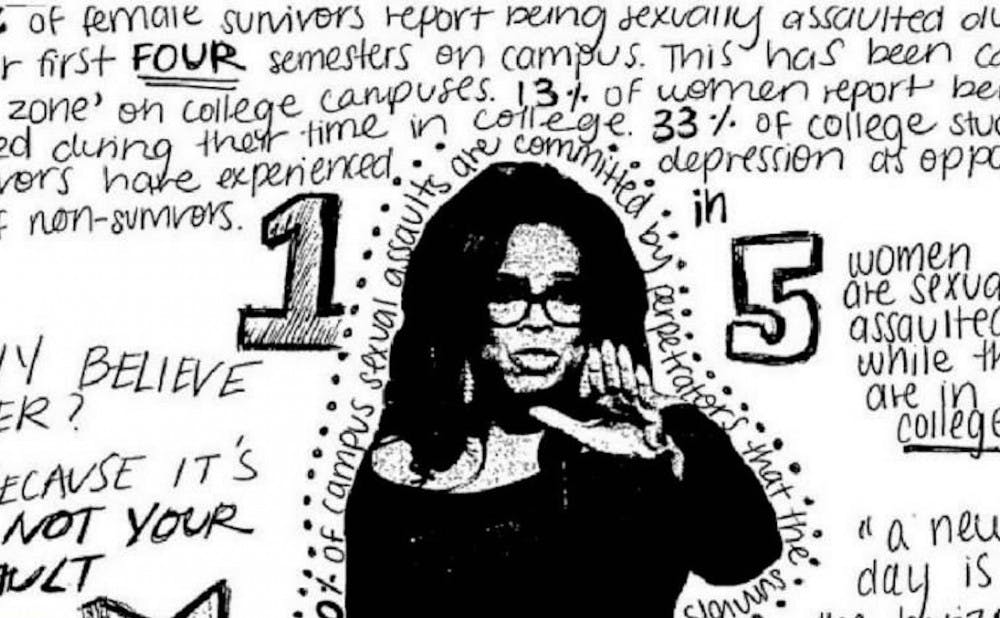In her recent, fiery Golden Globes speech, Oprah Winfrey said, “I want all the girls watching here, now, to know that a new day is on the horizon! And when that new day dawns, it will be because of a lot of magnificent women … fighting hard to make sure that they become the leaders who take us to the time when nobody ever has to say ‘Me too’ again.”
We are witnessing a women’s movement in our time, the likes of which we haven’t seen since women won the right to vote in 1920. This time, we’re fighting against gender violence, specifically sexual assault and the culture that has long been silencing us. Monday night, amid the #MeToo and Time’s Up movements, women from all sectors of Duke came together for Believe Her, a discussion on gender violence on campus.
The Bridge, a student-run online publication for Black and Latina women at Duke and UNC-Chapel Hill, sponsored the event and co-led the discussion with Dr. Nahal Kaivan and Dr. Marvice Marcus, both of whom work for Duke Counseling & Psychological Services. The pair acted as moderators for a forum on students’ understanding of Duke’s campus culture surrounding sexual assault. This discussion was particularly poignant given a survey released by the University in March 2017 that placed campus undergraduate sexual assault rates at 40% overall for women — twice the national average for college-aged females.
Almost immediately, attendees recognized the pervasive sexual assault narratives on campus as centering primarily on white, heterosexual women. This inaccurate representation of gender violence is especially problematic given that sexual assault and other forms of gender violence affect people of color and LGBTQIA+ identifying individuals disproportionately — at Duke, 42% of black women, 54% of latina women, and 59% of gay, lesbian and bisexual women are sexually assaulted during their undergraduate career.
One attendee said, “sexual assault at Duke is a very straight issue. Members of the LGBT community are not included in the discussion or considered. People just think that [sexual assault] doesn’t happen unless it’s between a man and a woman.”
Mumbi Kanyogo, co-editor in chief of The Bridge, added: “As a black woman on campus, it’s difficult to speak about sexual assault within our specific communities, because we’re at a PWI [predominantly white institution] where we’re constantly having to perform respectability politics that make it hard to call people out in your community that perpetuate the culture that makes sexual assault, rape and harassment posible.”
Perhaps one of the most visually striking things about the Believe Her discussion was the alarming lack of male-presenting participants. The only man in the packed Holsti-Anderson Reading Room was speaker Dr. Marcus.
One student attributed the lack of men to their unwillingness to recognize their participation in a larger misogynistic machine: “The conversations on campus have, unfortunately, othered a lot of males. They feel immediately when the conversation comes up that they are themselves being blamed. Even if they haven’t committed any acts of gender violence themselves, they refuse to think about it in terms of, ‘What are the little things that I’ve been doing, or how can I actually help?’”
Our culture has forged a toxic relationship between masculinity and violence, and it is this relationship that has allowed sexual assault to persist. In order to progress toward a society that doesn’t tolerate gender violence, we must engage everyone in conversation — men and non-survivors included.
Another student recognized that our campus discussions of sexual assault leave very little room for male survivors. According to the University survey, 10 percent of men at Duke have been sexually assaulted during their undergraduate Duke career, and yet Monday’s event was titled “Believe Her.” If there is a hierarchy of humiliation in sexual assault survivors, are men not at the top? In our efforts to include all women in this discussion, have we forgotten that men can also be assaulted?
Believe Her was a starting point for shifting, revising and fact-checking Duke’s current narrative of gender violence on campus. It was a call for us — everyone who considers themselves a part of the Duke community — to exchange in more open, honest dialogue, to consider life from another’s perspective and to believe one another — because accusers don’t benefit from speaking out.
Sexual assault and gender violence are, and always will be, complex issues with so much to unpack. The conversations around them are uncomfortable because they require that we examine not only our own practices and the ways in which we interact with one another, but the culture we live in and perpetuate. Believe Her along with other discussions are a starting point, but there is work to be done. Believing and supporting survivors and standing in solidarity, whether that means #MeToo or telling our misogynist society that it’s “Time’s Up” — that’s what our campus needs, what our community needs and what our world needs.
Get The Chronicle straight to your inbox
Signup for our weekly newsletter. Cancel at any time.

